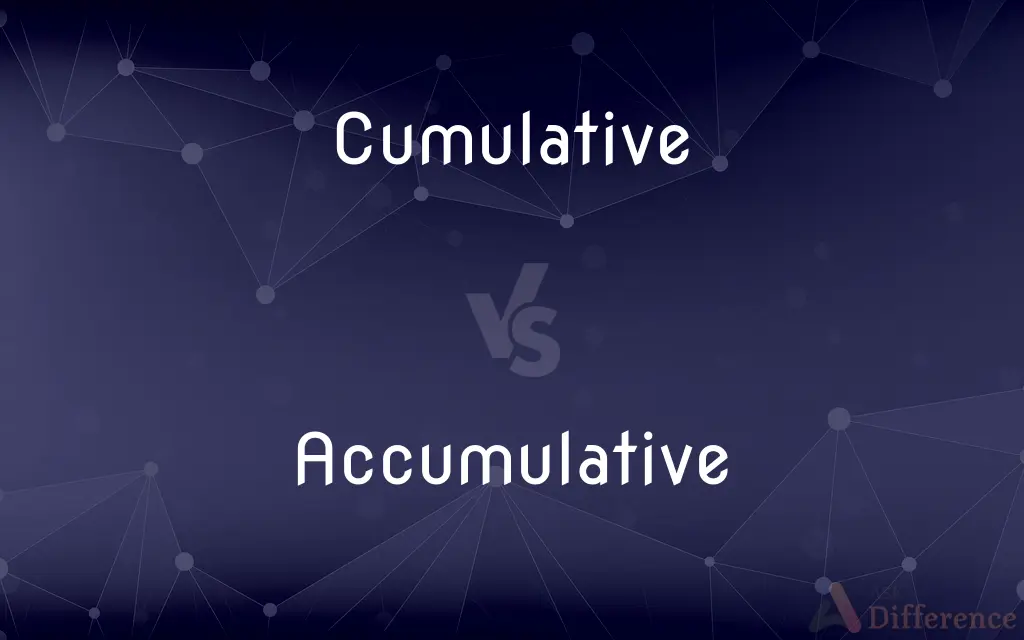Cumulative vs. Accumulative — What's the Difference?
By Tayyaba Rehman — Updated on September 18, 2023
"Cumulative" refers to the total amount after regularly increasing or adding amounts, while "Accumulative" emphasizes the action or process of gathering or amassing over time. Both often overlap in usage.

Difference Between Cumulative and Accumulative
Table of Contents
ADVERTISEMENT
Key Differences
"Cumulative" and "Accumulative" both denote the increase of something over time, yet each has its nuances. While "Cumulative" often refers to the growing total resulting from continuous additions, "Accumulative" emphasizes the action or process of accumulating.
When discussing effects or results that build over time, one might refer to the "Cumulative" effects. In contrast, if one is emphasizing the ongoing act of collection, they might choose the word "Accumulative."
In financial contexts, the word "Cumulative" might describe interest that is added to the principal amount (compounded), while "Accumulative" might underline the act of saving or piling up assets.
In academic settings, one might speak about a student's "Cumulative" grade point average, which is the overall average of course grades. On the other hand, "Accumulative" might be used to describe the gradual gathering of knowledge or skills.
To put it in simpler terms, while both words can often be used interchangeably, "Cumulative" leans towards describing the resultant total, and "Accumulative" leans towards the action or process leading to that total.
ADVERTISEMENT
Comparison Chart
Focus
On the growing total
On the action of gathering
Common Usage
Cumulative effects, cumulative total
Accumulative knowledge, accumulative savings
Contexts
Results that build over time
Ongoing act of collection
Nuance
Reflects the sum of parts
Reflects the process of addition
Synonyms
Aggregate, total
Gathering, collecting
Compare with Definitions
Cumulative
Increasing or growing by successive additions.
The cumulative effect of sleep deprivation can be harmful.
Accumulative
Relating to the action of accumulating or being accumulated.
The accumulative knowledge over the years helped him in his research.
Cumulative
Pertaining to the total amount of something.
The cumulative score was higher than expected.
Accumulative
Growing through steady additions.
His wealth is the result of accumulative investments.
Cumulative
Comprising successive additions.
The cumulative sales for the year were record-breaking.
Accumulative
Tending to gather or amass.
His accumulative habits meant he rarely threw things away.
Cumulative
Increasing or increased in quantity, degree, or force by successive additions
The cumulative effect of two years of drought
Accumulative
Resulting from repeated additions.
The book is an accumulative effort of multiple authors.
Cumulative
Increasing or enlarging by successive addition.
Accumulative
Gathering or growing by gradual increases
The accumulative effects of pollution
Cumulative
Acquired by or resulting from accumulation.
Accumulative
Characterized by or showing the effects of accumulation; cumulative.
Cumulative
Of or relating to interest or a dividend that is added to the next payment if not paid when due.
Accumulative
Tending to accumulate.
Cumulative
Supporting the same point as earlier evidence
Cumulative evidence.
Accumulative
Characterized by accumulation; serving to collect or amass
Cumulative
Imposed with greater severity upon a repeat offender
Cumulative punishment.
Accumulative
Having a propensity to amass; acquisitive.
Cumulative
Following successively; consecutive
Cumulative sentences.
Accumulative
Characterized by accumulation; serving to collect or amass; cumulative; additional.
Cumulative
Of or relating to the total observed frequency of data, or the probability of a random variable, that is less than or equal to a specified value.
Accumulative
Increasing by successive addition;
The benefits are cumulative
The eventual accumulative effect of these substances
Cumulative
Of or relating to experimental error that increases in magnitude with each successive measurement.
Accumulative
Marked by acquiring or amassing;
We live in an accumulative society
Cumulative
Incorporating all current and previous data up to the present or at the time of measuring or collating.
Accumulative
Increasing in size or quantity by successive additions.
The accumulative deposits made her a wealthy individual.
Cumulative
That is formed by an accumulation of successive additions.
Cumulative
(linguistics) Adding one statement to another.
Cumulative conjunctions like and, both…and and as well as
Cumulative
That tends to accumulate.
Cumulative
(finance) Having priority rights to receive a dividend that accrue until paid.
Cumulative
(law) of evidence, witnesses, etc. Intended to illustrate an argument that has already been demonstrated excessively.
The state wants to bring in ten blood-spatter experts to testify. Your Honor, that is cumulative testimony.
Cumulative
Composed of parts in a heap; forming a mass; aggregated.
Cumulative
Augmenting, gaining, or giving force, by successive additions; as, a cumulative argument, i. e., one whose force increases as the statement proceeds.
The argument . . . is in very truth not logical and single, but moral and cumulative.
Cumulative
Tending to prove the same point to which other evidence has been offered; - said of evidence.
Cumulative
Increasing by successive addition;
The benefits are cumulative
The eventual accumulative effect of these substances
Cumulative
Reflecting the total sequence of something.
Her cumulative experience made her an expert.
Cumulative
Growing in quantity or effect.
The cumulative data supported the hypothesis.
Common Curiosities
Does "Accumulative" always imply a physical gathering?
No, it can refer to intangible things, like knowledge or experiences.
Can I use "Accumulative" instead of "Cumulative" in most contexts?
They can be used interchangeably in many cases, but consider the specific nuance you wish to convey.
Are "Cumulative" and "Accumulative" synonyms?
They often overlap in meaning, but "Cumulative" focuses on total results while "Accumulative" emphasizes the gathering process.
Is "Cumulative" mostly used in academic contexts?
It's common in academia, like "cumulative GPA," but it's also used in various other fields.
How does "Cumulative interest" differ from "Accumulative interest"?
"Cumulative" would describe the total interest, while "Accumulative" emphasizes the action of interest being added.
Can a book be described as "Accumulative"?
Yes, if it's a result of gathering or compiling various pieces of information.
Is "Accumulative" commonly used in finance?
Yes, especially when discussing the process of accumulating assets or wealth.
Can "Cumulative" describe knowledge?
Yes, as in "cumulative knowledge," referring to all knowledge amassed over time.
Is "Cumulative" always positive?
No, it's neutral. It can be used in positive, negative, or neutral contexts.
Which word should I use to describe the effects of a drug over time?
"Cumulative" would be more appropriate to describe the total effects over time.
Would "Accumulative" describe a collector's behavior?
Yes, it emphasizes the act of collecting or amassing items.
Is one word more formal than the other?
Both are formal and can be used in professional or academic contexts.
Do both words relate to time?
Often, both imply a progression or growth over time.
How do I choose between the two words?
Consider if you're focusing on the end total/result ("Cumulative") or the act of gathering ("Accumulative").
Can "Cumulative" describe experience?
Yes, as in "cumulative experience," meaning the total experience gained over time.
Share Your Discovery

Previous Comparison
Rapport vs. Report
Next Comparison
Coccyx vs. SacrumAuthor Spotlight
Written by
Tayyaba RehmanTayyaba Rehman is a distinguished writer, currently serving as a primary contributor to askdifference.com. As a researcher in semantics and etymology, Tayyaba's passion for the complexity of languages and their distinctions has found a perfect home on the platform. Tayyaba delves into the intricacies of language, distinguishing between commonly confused words and phrases, thereby providing clarity for readers worldwide.
















































